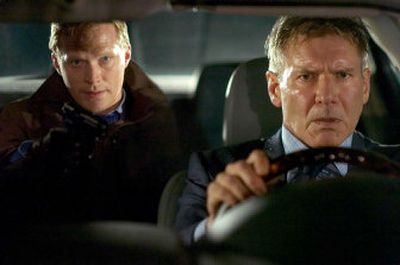Ford tough

Trust him, the once and future Indiana Jones is still up to the challenge.
It’s been three years since Harrison Ford has hit the screen, his longest stretch without a movie since “Star Wars” launched him to celebrity nearly 30 years ago. It’s been even longer since he scored a solid hit.
But he’s back on familiar ground with the new high-tech heist flick “Firewall,” playing another Everyman character forced to rise to the occasion.
And Ford hopes that two other pet projects will follow closely: “Manhunt,” a 19th century drama in which he’s cast as the Army detective who tracks down Abraham Lincoln’s assassin, John Wilkes Booth; and that elusive fourth chapter in the “Indiana Jones” saga.
Ford, producer George Lucas and director Steven Spielberg have kicked “Indy 4” ideas around for years as several screenwriters had a go at the script.
“We’re now closer than we’ve ever been,” Ford says. “I think it’ll happen pretty soon.”
At an American Film Institute bash for Lucas last year, Ford joked that they had to hurry, or co-star Sean Connery would be too old to play Jones’ father.
At 63, does Ford feel too old to play dashing adventurer Indy?
“No, no. Indiana Jones changes just like everybody else,” he says. “I don’t have any issues with that, and I still feel physically adequate to faking it just like I’ve been doing for 30 years.
“I’m looking forward to it. It’s good fun.”
Though he had a three-year hiatus between 2003’s crime-comedy flop “Hollywood Homicide” and “Firewall,” Ford says the new film took an unusually long time to get into production as the script evolved and personnel changed.
Directed by Richard Loncraine (“Wimbledon,” “Brimstone & Treacle”), “Firewall” casts Ford as a computer-security expert forced to help carry out a $100 million cyber bank job after a crook (Paul Bettany) takes his wife (Virginia Madsen) and children hostage.
“Firewall” maintains a thread common to many of Ford’s most successful roles. In “Air Force One,” he played a U.S. president who turned action hero to thwart hijackers. In “The Fugitive,” he was a doctor on the lam, trying to prove himself innocent of his wife’s murder. In “Patriot Games” and “Clear and Present Danger,” he was a CIA desk jockey pressed into field service.
Films veering from that unlikely-hero formula often have failed Ford, including such box-office duds as the romantic drama “Random Hearts” and the gloomy submarine saga “K19: The Widowmaker.”
With more than his share of commercial fortune from his “Star Wars” and “Indiana Jones” days – plus hits such as “Witness,” “Working Girl” and “Presumed Innocent” – Ford is unconcerned about maintaining blockbuster status in Hollywood.
“I don’t have to be on top anymore. I just have to be available,” he says. “Yes, you certainly hope for some success for your films, because there’s a lot of money invested, and you want to see people get their money back, at least.
“But the business is far less predictable than it used to be. The competition is greater, the time allotted in a theater for the movie to find its audience is less, the cost of advertising is higher. It’s just become more complicated, and at the same time, the movies that seem to be making money, become box-office successes, are kinds of films that I’ve never really done that much.”
His character in “Firewall” is a techno-whiz, jury-rigging bits and pieces from cell phones, fax machines and MP3 players.
Ford said he would be lost trying any of that himself, finding technology a perpetual-motion process that forces users to continually upgrade.
“I think it becomes an end in itself,” says Ford, who prefers vinyl music over digital and uses e-mail sparingly.
“Obviously, the business end of technology is you’ve got to keep changing and improving your products in order to keep selling new ones. So the minute you accept that technology is useful in a particular area, then you’re buying into a whole endless chain of improvements that might be brought forth to deal with something that was really simple before.
“I mean, I used to love making lists. Lists were very important to me. I physically had something I could cross off. It’s not the same anymore.”
Ford feels the same about Hollywood’s new age of computerized visual effects, which have been embraced by colleagues Lucas on “Star Wars” and Spielberg on “Jurassic Park,” “War of the Worlds” and other sci-fi spectacles.
Bigger, better computer pyrotechnics dwarf the drama of the characters’ plight, he says. His own climactic smackdown with Bettany in “Firewall” is a bloody, sweaty duel where the stakes are clear: One man has to die.
“What we’ve lost is the impulse to keep things at human scale. We’ve gone for effect rather than affect,” Ford says. “It’s a shame, because I think this little fight scene in this movie is a good example of how emotionally powerful a gritty little fight scene can be.
“Whereas, a lot of what passes for action in some films I’ve seen is nothing more than a display of kinetics. You don’t even know where the punch came from or who threw it. It’s ‘Pow! Whack! Wham!’ And then somebody can fly all of a sudden.
“Give me a break. How do people emotionally relate to that? They don’t. They just sit back and then emotion becomes not an issue in it. It becomes just a visual experience.”